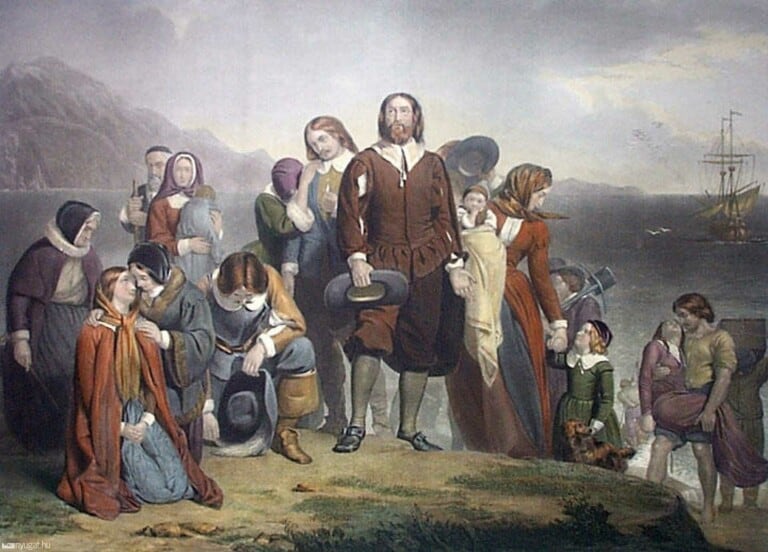The Puritan New World vision in the longer schemes of things
English Puritans can be divided into several groups. Most of the Puritans remained in England. They accepted the principle of Oliver Cromwell’s Commonwealth, with the Separatists (no affiliation with authority and the English Protestant Church). They were persecuted and many of them had to run away and come to the New World.
To many Puritans, Christopher Columbus’s passage into America was one of the most important historical events as the sign of a bigger historical destiny, as well as Gutenberg’s printing press (1456) and the Protestant Reformation: 3 events, at the same time geographical, textual and religious, marking the beginning of a New World.
Gutenberg’s invention was particularly important for the New England Protestants for their frequent use of texts (a major means of communication). The Puritan society was a unique form of society in the sense that they defined their identity essentially through texts.
Throughout the 17th century, colonial identity was the product of two things:
- Literature or texts
- And concrete movement in social and geographical space.
This particular form of identity can be seen through different aspects of literary expression: the Puritans used these aspects as sermons, declarations, covenants, controversies and statements of purpose.
Therefore, the lasting effect of the printing press on colonial America is to be found in its contribution to the emergence of a national identity based first and foremost on language and writing.
It was first through publication that America declared to the world its identity as a nation and through an effect of discourse she defined proclaimed and projected its past, its present, and its future.
Realizing the vision: the image of the future played out in the New World
As far as the Puritan world vision is concerned, the conception of their role in the discovery of America is profoundly religious: it’s inseparable from the biblical metaphors of the Apocalypse and the coming of the millennium.
Indeed, their historical and geographical position in America is closely related to their biblical definition of themselves and America. In the bigger divine plan, the Puritans are God’s chosen people.
Their destination, both spiritual and geographical is America, the new Israel that marks the beginning of the millennium. In this context, it’s also important to add that the millennium utopianism of the Puritans goes hand in hand with their political and religious beliefs.
Through a characteristic synthesis, the Puritans defined their system as a church-state. They believed this religious political system should be a model for the Christian world.
The Puritans considered their historical role in the New World as that of a universal community organized under a “federal” or “national” contract, called a covenant.
Therefore, in John Winthrop’s words, the new church-state was supposed to be “a city upon a hill”, a universal “model of Christian charity” (taken from the sermon he made abroad on the ship The Arbella in 1630).
But, with the beginning of the Restoration in 1660, the Puritans lost all hope of spreading their universal vision through England.
The realization of the Puritans’ vision was turned fully toward America and, consciously or unconsciously, the second or third generation of Puritans adopted European metaphors of America, those that they used in their futuristic vision of both land and history.
Thus, the imaginary visions of America as a utopia became synonymous with the New Heaven promised by the Revelation (the Apocalypse). In this apocalyptic vision, geographical and literary exploration, textuality, and religious imagery are inseparable.
These three aspects of the Puritan New World vision represent their most lasting contribution to the American sense of community and identity.
From the Declaration of Independence to the notion of Manifest Destiny (John L. O’Sullivan) to the New Frontier (John F. Kennedy), the USA has always seen its confrontation with the future as a sort of battle of the wilderness: the nation’s representation of itself reminds us of the Puritans and their imaginary vision of the New World: the vision of a nation in danger, of a plantation facing a complex and hostile environment, of a unified community gaining strength from the challenges of its environment.
Throughout this vision, we found three fundamental elements of American identity:
- The imaginary projection of nature is the scene of an especially American self.
- The representation of a self that uses such a scene to enact a specifically American model of self-realization (in the future).
- The conscious or unconscious references to biblical imagery and the biblical conception of history: American identity as a necessary self-fulfilling promise.
